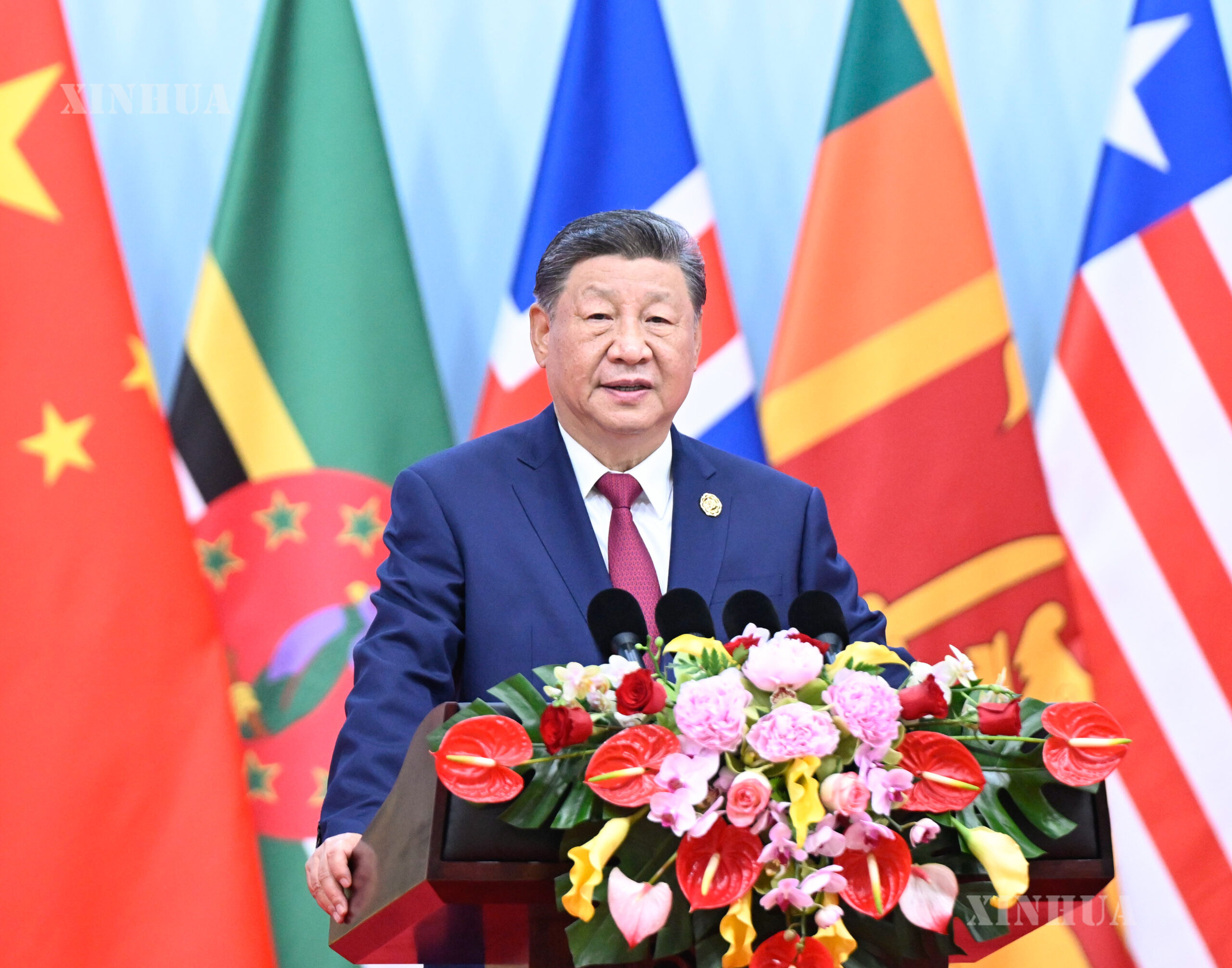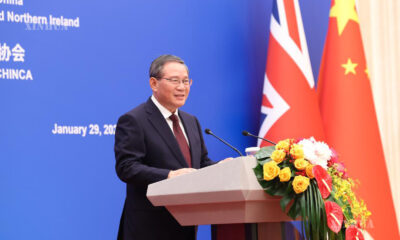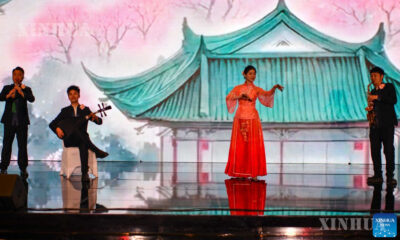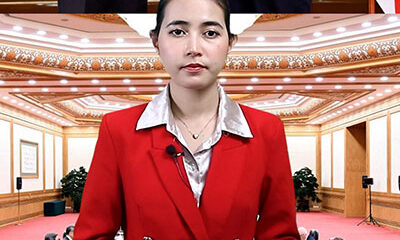China
နိစ္စဓူဝ အိမ်မှုကိစ္စများမှ ဖယ်ခွာကာ ပိုမိုကျယ်ပြန့်သော နယ်ပယ်များကို စူးစမ်းရှာဖွေလာသည့် အမျိုးသမီးများ

ပေကျင်း၊ အောက်တိုဘာ ၁၄ ရက် (ဆင်ဟွာ)
လွန်ခဲ့သော နှစ် ၅၀ ကျော်က ဆယ်ကျော်သက်အရွယ် လူငယ်တစ်ဦးဖြစ်သည့် ရှီကျင့်ဖိန်မှာ ကျေးလက်ဒေသတွင် သွားရောက်နေထိုင်ကာ အလုပ်လုပ်ကိုင်ရန် မြို့ကြီးများမှ စေလွှတ်လိုက်သော သန်းနှင့်ချီသည့် “ခေတ်ပညာတတ်လူငယ်များ” အနက် တစ်ဦးအပါအဝင်ဖြစ်ခဲ့သည်။
လိုအက် (Loess) ကုန်းပြင်မြင့်၌ တည်ရှိသော ဆင်းရဲနွမ်းပါးသည့် လျန်ကျားဟယ်ကျေးရွာတွင် ၎င်းအနေဖြင့် ကျေးလက်လူမှုဘဝ၏ ခက်ခဲကြမ်းတမ်းမှုများကို ကိုယ်တိုင်မြင်တွေ့ခဲ့ရကာ အမျိုးသမီးများ ထမ်းပိုးထားရသော ကြီးလေးသည့် ဝန်ထုပ်ဝန်ပိုးများကို မြင်တွေ့ပြီးနောက် ၎င်း၏စိတ်သန္တာန်ဝယ် ထူးခြားသော ခံစားချက်တစ်ခု ကျန်ရစ်ခဲ့လေသည်။
“အမျိုးသမီးတစ်ယောက်ရဲ့ဘဝက ဘာလို့များ ဒီလောက်တောင် အမြဲတမ်း ပင်ပန်းဆင်းရဲနေရတာလဲ” ဟု ရွာခံတစ်ဦးဖြစ်သလို မိတ်ဆွေတစ်ဦးလည်းဖြစ်သူ ဝူဟွေ့အား ရှီက ပြောခဲ့ဖူးသည်။
ရှီမှာ ဝမ်းနည်းရုံသက်သက်သာ မဟုတ်ခဲ့ပေ။ ၎င်းမှာ ငယ်ရွယ်သူတစ်ဦးသာဖြစ်သော်လည်း ပြည်သူများ၏ လူမှုဘဝကို မြှင့်တင်ပေးနိုင်မည့် နည်းလမ်းများကိုပင် စဉ်းစားရှာဖွေခဲ့သည်။
ရှီမှာ အသက် ၁၆ နှစ် မပြည့်မီကပင် လျန်ကျားဟယ်ကျေးရွာသို့ ရောက်ရှိခဲ့ခြင်းဖြစ်ကာ ထိုကျေးရွာ၌ ခုနစ်နှစ်ကြာ ဖြတ်သန်းခဲ့ပြီးနောက် တရုတ်ကွန်မြူနစ်ပါတီ (CPC) သို့ ဝင်ရောက်ခဲ့ပြီး နောင်တွင် ကျေးရွာ၏ ပါတီအကြီးအကဲအဖြစ် တာဝန်ထမ်းဆောင်ခဲ့သည်။
ထိုစဉ်က ဒေသခံ ရွာသူရွာသားများအဖို့ လယ်လုပ်ငန်းမှာ အတော်အတန် ပင်ပန်းလှသဖြင့် တောင်သူများ၏ အဝတ်အစားများမှာ လျင်လျင်မြန်မြန် စုတ်ပြဲလေ့ရှိသည်။ အမျိုးသမီးများမှာ လယ်ကွင်းထဲတွင် တစ်နေ့တာလုံး ပင်ပင်ပန်းပန်း အလုပ်လုပ်ပြီးနောက် ညဘက်တွင်လည်း ခပ်မှိန်မှိန် ရေနံဆီမီးအိမ်အောက်ဝယ် တစ်မိသားစုလုံးအတွက် အဝတ်အစားများကို ဖာထေးချုပ်လုပ်ပေးရပြန်သည်။
သို့ဖြစ်၍ ကျေးလက်နေ အမျိုးသမီးများ၏ ဝန်ထုပ်ဝန်ပိုးများ ပြေလျော့စေရန်အလို့ငှာ ရှီက ရွာခံများကို စုစည်းကာ အဝတ်အထည်များချုပ်လုပ်သည့် အသင်းအဖွဲ့တစ်ခုကို တည်ထောင်ခဲ့သည်။
ထိုအသင်းအဖွဲ့က ကျွမ်းကျင်စက်ချုပ်သမများကို ခေါ်ယူစုဆောင်းကာ စက်ချုပ်သည့်အလုပ်ကို လုပ်ကိုင်စေခဲ့ပြီး ယင်းအတွက် ရွာသားများက ၎င်းတို့၏ လုပ်အားစိုက်ထုတ်မှုအရ ခွဲဝေရရှိသော ဝင်ငွေဖြင့် အဖိုးအခ ပေးချေကြသည်ဟု ထိုစဉ်က ၎င်းနှင့်အတူ အလုပ်လုပ်ခဲ့ဖူးသည့် ဝူက ပြန်လည်ပြောပြခဲ့သည်။
အဆိုပါ အသင်းအဖွဲ့ကြောင့် အချုပ်အလုပ်ကျွမ်းကျင်သော ဒေသခံ အမျိုးသမီးများအနေဖြင့် ၎င်းတို့၏ ကျွမ်းကျင်မှုအလျောက် ဝင်ငွေရရှိနိုင်သလို အခြားသူများအနေဖြင့်လည်း အိမ်အလုပ်များအတွက် အချိန်ပေးစရာမလိုတော့ဘဲ ၎င်းတို့၏ သီးနှံစိုက်ပျိုးထုတ်လုပ်သည့် အလုပ်အပေါ် တွင်သာ အာရုံစိုက်နိုင်ခဲ့သည်။
အမျိုးသမီးများအနေဖြင့် ဘောင်ကျဉ်းကျဉ်းလေးထဲတွင် ကန့်သတ်ခံထားရခြင်းမျိုး မဖြစ်သင့်ဘဲ ပြင်ပကမ္ဘာ၏ ပိုမိုကျယ်ပြန့်သော နယ်ပယ်များကို လက်လှမ်းမီသင့်သည်ဟု ထိုနှစ်ကာလများအတွင်း ရှီက အစဉ်တစိုက် ယုံကြည်ခဲ့သည်။
တရုတ်နိုင်ငံ အရှေ့ပိုင်း ဖူကျန့်ပြည်နယ် နင်တယ်ဒေသတွင် ပါတီအကြီးအကဲအဖြစ် တာဝန်ထမ်းဆောင်နေသည့် ၁၉၉၀ ပြည့်နှစ် မတ်လတွင် ရှီက ထိုခေတ်ထိုအခါက အမျိုးသမီးများအပေါ် လူအချို့၏ ခွဲခြားဆက်ဆံသော အမြင်များကို ချေပရန် ပြည်တွင်းသတင်းစာတစ်စောင်၌ ဆောင်းပါးတစ်ပုဒ် ရေးသားကာ လူမှုရေးဆိုင်ရာ တိုးတက်မှုတွင် ပြည်တွင်းမှ အမျိုးသမီးများ၏ အရေးပါသော အခန်းကဏ္ဍကို အလေးထားပြောဆိုခဲ့သည်။
“ကျေးလက်နေ အမျိုးသမီးတွေဟာ အများပြည်သူဆိုင်ရာ ဇာတ်ခုံတွေ၊ စင်မြင့်တွေနဲ့ မသက်ဆိုင်ဘဲ မီးဖိုချောင်အလုပ်ကိုပဲ လုပ်သင့်တယ်လို့ တစ်ချိန်က ပြောဆိုခဲ့ကြပါတယ်” ဟု ၎င်းက ရေးသားခဲ့သည်။
“ဒါပေမဲ့လည်း ဆိုရှယ်လစ်တော်လှန်ရေးကာလနဲ့ ပြုပြင်တည်ဆောက်ရေးကာလမှာ နိုင်ငံအရှေ့ပိုင်း ဖူကျန့်ပြည်နယ် (နင်တယ်) က အမျိုးသမီးများစွာဟာ မီးဖိုခန်းထဲကနေ၊ အိမ်ထဲကနေထွက်ပြီး လူမှုအဖွဲ့အစည်းထဲကို ဝင်ရောက်ကာ အလုပ်တာဝန်အမျိုးမျိုးမှာရော နိုင်ငံရေးလှုပ်ရှားမှုတွေမှာပါ ပါဝင်ခဲ့ကြပါတယ်” ဟု အဆိုပါ သတင်းစာဆောင်းပါးထဲတွင် ရှီက မှတ်ချက်ပြုခဲ့သည်။ (Xinhua)
သတင်းအပြည့်အစုံကို ဖော်ပြပါလင့်ခ်မှတစ်ဆင့် ဝင်ရောက်ဖတ်ရှုနိုင်ပါသည်။
https://english.news.cn/20251010/d2620649bc894224a7a1052c795f1e09/c.html
…………………
(English Version)
Xi Story: Women breaking free from household chores to explore broader horizons
BEIJING, Oct. 10 (Xinhua) — More than half a century ago, Xi Jinping, then a teenager, was among millions of “educated youths” sent from cities to live and work in the countryside.
In Liangjiahe, a poor village on the Loess Plateau, he witnessed firsthand the hardships of rural life. The heavy burdens borne by women left a particular impression on him.
Xi once said to Wu Hui, a local villager and friend: “Why is the life of a woman always so hard?”
For him, this was not merely a lament. Even at that young age, he was already searching for ways to improve people’s lives.
Xi arrived in Liangjiahe before turning 16. He spent seven years there, joining the Communist Party of China (CPC), and later serving as the village’s Party chief.
Back then, the farming work for local villagers was quite heavy, and farmers’ clothes would wear out quickly. After a long day of labor in the fields, women still had to sit by dim kerosene lamps at night, doing the mending and sewing work for the whole family.
To ease the burden of rural women, Xi organized the villagers to establish a sewing cooperative.
Wu, who worked with him at that time, once recalled that the cooperative recruited skilled seamstresses to run sewing services, and the villagers made payments with a share of their income, their “work points,” for this service.
Thanks to the cooperative, local women who were good at sewing could earn an income via their skills, while others could focus on their production work without having to juggle it with household chores.
Over the years, Xi has always believed that women should not be confined to the narrowness of the eye of a needle — but should instead reach for the broader horizons of the outside world.
In March 1990, when he served as the Party chief of Ningde prefecture in east China’s Fujian Province, Xi published an article in a local newspaper to refute certain discriminatory views toward women held by some people at that time — and stressed the important role of local women in social development.
“It was once said that rural women are bound to work around the stove, not the podium, nor the public stage,” he wrote.
“However, numerous irrefutable facts have repeatedly proven that during the period of socialist revolution and construction, countless women in eastern Fujian (Ningde) walked away from the stoves, stepped out of their homes, and entered society, engaging in various forms of work and also participating in political activities,” Xi noted in his newspaper piece.
English Caption
Chinese President Xi Jinping attends the opening ceremony of the Global Leaders’ Meeting on Women and delivers a keynote speech at the China National Convention Center in Beijing, capital of China, Oct. 13, 2025. (Xinhua/Shen Hong)






